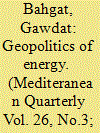| Srl | Item |
| 1 |
ID:
170850


|
|
|
|
|
| Summary/Abstract |
Political leaders describe the climate crisis as the greatest challenge of our time, but it plays only a marginal role in the foreign policy of most states and in the scholarly literature on international relations. Only 0.77 percent of the articles in five top international relations (IR) journals between 2015 and 2019 were about climate change. This is a problem, for when the full impact of climate change and policy responses to climate change is felt, it will redefine international politics. We suggest five broad areas where it is necessary to better understand how climate change will reshape world politics: sovereignty, security, status and reputation, norms and coalitions, and the geopolitics of energy.
|
|
|
|
|
|
|
|
|
|
|
|
|
|
|
|
| 2 |
ID:
141806


|
|
|
|
|
| Summary/Abstract |
The sharp drop in oil prices since June 2014 has drastically altered the global energy landscape. This essay examines the growing energy cooperation between Iran and Turkey and the strategic and economic implications for Europe. It argues that the emerging energy partnership between Tehran and Ankara can contribute to Europe’s energy security.
|
|
|
|
|
|
|
|
|
|
|
|
|
|
|
|
| 3 |
ID:
190371


|
|
|
|
|
| Summary/Abstract |
Long-term changes propelled by the clean-energy transition—in the distribution of geopolitical power, the meaning of sustainable energy consumption, and the scope and character of interdependence—are transforming the global energy order. Dependence on new critical materials and metals—such as chromium, copper, germanium and lithium, all essential inputs for many clean energy technologies—reflects new patterns of asymmetrical interdependence and calls into question some of our assumptions about oil and gas as strategic goods. Among these changes, the critical materials at the heart of the clean energy transition are infusing the geopolitics of energy with new meaning: the rise of renewables is undermining Russia’s position as an “energy superpower” at the precise moment that its relationship with Europe is being reshaped by its invasion of Ukraine.Footnote
|
|
|
|
|
|
|
|
|
|
|
|
|
|
|
|